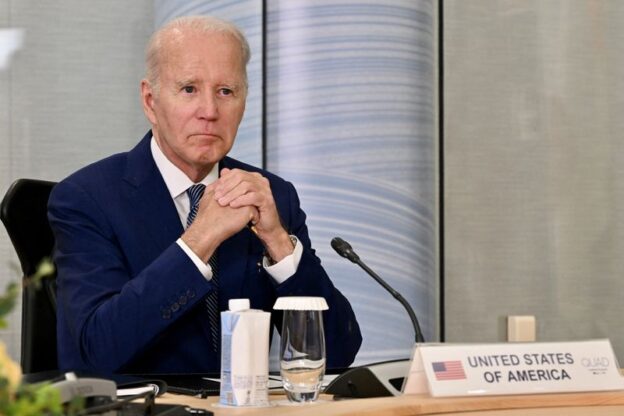© Reuters. U.S. President Joe Biden participates in a Quad Leaders’ meeting with Prime Minister Fumio Kishida of Japan, Prime Minister Narendra Modi of India, and Prime Minister Anthony Albanese of Australia, May 20, 2023, in Hiroshima, Japan. Kenny Holston/Pool via
By David Morgan, Jeff Mason and Trevor Hunnicutt
WASHINGTON (Reuters) -U.S. President Joe Biden and House Republican Speaker Kevin McCarthy will meet to discuss the debt ceiling on Monday, after a “productive” phone call as the president headed back to Washington, the two sides said on Sunday.
McCarthy, speaking to reporters at the U.S. Capitol following the call, said there were positive discussions on solving the crisis and that staff-level talks were set to resume later on Sunday.
Asked if he was more hopeful after talking to the president, McCarthy said: “Our teams are talking today and we’re setting (sic) to have a meeting tomorrow. That’s better than it was earlier. So, yes.”
A White House official confirmed Monday’s meeting but offered no specific time.
Staff members from both sides reconvened at McCarthy’s office in the Capitol on Sunday evening for talks that lasted about two-and-a-half hours.
Senior White House advisor Steve Ricchetti told reporters as he left the meeting, “We’ll keep working tonight.”
Biden, before leaving Japan following the G7 summit earlier on Sunday, said he would be willing to cut spending together with tax adjustments to reach a deal but the latest offer from Republicans ceiling was “unacceptable.”
Less than two weeks remain until June src, when the Treasury Department has warned that the federal government could be unable to pay all its debts, a deadline U.S. Treasury Secretary Janet Yellen reaffirmed on Sunday. A failure to lift the debt ceiling would trigger a default that would cause chaos in financial markets and spike interest rates.
McCarthy’s comments on Sunday appeared more positive than the increasingly heated rhetoric in recent days, as both sides reverted to calling the other’s position extremist and talks stalled.
“Much of what they’ve already proposed is simply, quite frankly, unacceptable,” Biden told a news conference in Hiroshima. “It’s time for Republicans to accept that there is no bipartisan deal to be made solely, solely on their partisan terms. They have to move as well.”
The president later tweeted that he would not agree to a deal that protected “Big Oil” subsidies and “wealthy tax cheats” while putting healthcare and food assistance at risk for millions of Americans.
He also suggested some Republican lawmakers were willing to see the U.S. default on its debt so that the disastrous results would prevent Biden, a Democrat, from winning re-election in 2024.
After Sunday’s call, McCarthy said while there was still no final deal, there was an understanding to get negotiators on both sides back together before the two leaders met: “There’s no agreement. We’re still apart.”
“What I’m looking at are where our differences are and how could we solve those, and I felt that part was productive,” he told reporters.
Meanwhile, concerns about default are weighing on markets as an increase in the government’s self-imposed borrowing limit is needed regularly to cover costs of spending and tax cuts previously approved by lawmakers.
On Friday, the United States was forced to pay record-high interest rates in a recent debt offer.
SPENDING CUTS
McCarthy said Republicans backed an increase in the defense budget while cutting overall spending, and that debt ceiling talks have not included discussions about tax cuts passed under former President Donald Trump.
A source familiar with the negotiations said the Biden administration had proposed keeping non-defense discretionary spending flat for the next year.
Biden ahead of the call stressed that he was open to making spending cuts and said he was not concerned they would lead to a recession, but he could not agree to Republicans’ current demands.
The Republican-led House last month passed legislation that would cut a wide swath of government spending by 8% next year. Democrats say that would force average cuts of at least 22% on programs like education and law enforcement, a figure top Republicans have not disputed.
Republicans hold a slim majority in the House and Biden’s fellow Democrats have narrow control of the Senate, so no deal can pass without bipartisan support. But time is running short as Monday’s meeting will take place with just src0 days left to hammer out a deal before hitting Treasury’s deadline.
McCarthy has said he will give House lawmakers 72 hours to review an agreement before bringing it up for a vote.
The last time the nation has come this close to default was in 20srcsrc, also with a Democratic president and Senate with a Republican-led House.
Congress eventually averted default, but the economy endured heavy shocks, including the first-ever downgrade of the United States’ top-tier credit rating and a major stock sell-off.

Comments are closed